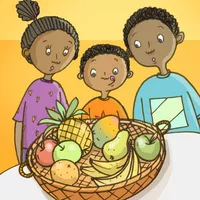(Punishment) العِقَابُ.
The punishment|The punishment
(Strafe) Die Strafe.
(Punishment) The punishment.
(Castigo) Castigo.
(Punition) La punition.
(Punizione) La punizione.
(罰)罰。
(처벌) 벌.
(Straf) De straf.
(Kara) Kara.
(Punição) Punição.
(Наказание) Наказание.
(Ceza) Ceza.
(惩罚)惩罚。
في أحد الأيام، حَصَلَتْ مَامَا على الكثير من الفواكه.
on|one of|one day|got|Mama||a lot||the fruits
Eines Tages hatte Mama viele Früchte.
One day Mama got lots of fruits.
Um dia, mamãe comeu muitas frutas.
سألناها: "متى يُمْكِنُنَا أن نأخذ القليل منها؟"، فأجابت: "سنأكل الفواكه في المساء".
We asked her|"When"|we can|"to"|take some of|a little bit|from it|She answered|we will eat|the fruits|"in the"|the evening
Wir fragten sie: „Wann können wir welche haben?“ Sie antwortete: „Wir werden am Abend Obst essen.“
We asked her, "When can we have a few?" She replied, "We will eat fruit in the evening."
Perguntamos a ela: “Quando podemos comer?” Ela respondeu: “Comeremos frutas à noite.”
أخي رهيم كان طماعًا، تذوق كل الفواكه، وأكل الكثير منها.
|Rahim|was|greedy|tasted||the fruits|and ate|a lot|"of them"
Mein Bruder Raheem war gierig. Er probierte alle Früchte und aß viele davon.
My brother Raheem was greedy, he tasted all the fruits, and ate a lot of them.
Mon frère Raheem était gourmand, il goûtait tous les fruits et en mangeait beaucoup.
Meu irmão Raheem era ganancioso, provou todas as frutas e comeu muitas delas.
صرخ أخي الصغير: "انظر ماذا فعل رهيم"!
shouted|My brother|my little brother|"Look"||did|
Mein kleiner Bruder rief: „Schau, was Raheem getan hat!“
My little brother shouted: "Look what Raheem did!"
Meu irmão mais novo gritou: “Olha o que Raheem fez!”
Küçük kardeşim bağırdı: "Raheem'in yaptığına bak!"
أما أنا فقلت: "رهيم غير محترم وأناني".
"As for"|"I"|I said|disrespectful and selfish|not|respectful|self-centered
|||Rahim|||
Ich meinte: „Raheem ist respektlos und egoistisch.“
As for me, I said: "Raheem is disrespectful and selfish."
Quant à moi, j'ai dit : "Raheem est irrespectueux et égoïste".
Quanto a mim, disse: “Rahim é desrespeitoso e egoísta”.
Bana gelince, "Raheem saygısız ve bencildir" dedim.
غضبت ماما من رهيم، ونحن أيضًا غضبنا منه ولكنه لم يعتذر.
got angry|Mom|from|Raheem|"we also"||we got angry|at him|but he|did not|did not apologize
Mama wurde wütend auf Raheem, und wir waren auch wütend auf ihn, aber er entschuldigte sich nicht.
Mama got angry at Rahim, and we got angry at him too, but he didn't apologize.
Maman s'est fâchée contre Rahim, et nous aussi, mais il ne s'est pas excusé.
Mamãe estava com raiva de Raheem e nós também estávamos com raiva dele, mas ele não se desculpou.
Annem Rahim'e kızdı, biz de ona kızdık ama özür dilemedi.
سأل أخي الصغير: "ألن تعاقبي رهيم؟"
asked|My brother|little brother|"Won't"|punish|
Mein kleiner Bruder fragte: „Wirst du Raheem nicht bestrafen?“
My little brother asked, "Won't you punish Raheem?"
Meu irmão mais novo perguntou: “Você não vai punir Raheem?”
حذرت ماما رهيم، فقالت: "عليك أن تعتذر حالاً".
warned|Mom||she said|You must|to|apologize immediately|immediately
Mama warnte Raheem: „Du musst dich jetzt entschuldigen“, sagte sie.
Mama warned Raheem, "You have to apologize now."
Maman a prévenu Raheem : "Tu dois t'excuser maintenant."
Mamãe avisou Raheem: “Você tem que se desculpar agora”, disse ela.
Annem Raheem'i uyardı, "Şimdi özür dilemelisin."
بدأ رهيم بالشعور بالمرض، وهمس: "معدتي تؤلمني".
started||feeling|sick|whispered|my stomach|"hurts me"
Raheem wurde schlecht und er flüsterte: „Mein Magen tut weh.“
Rahim began to feel ill, and whispered, "My stomach hurts."
Rahim kendini kötü hissetmeye başladı ve "Midem ağrıyor" diye fısıldadı.
عرفت ماما ماذا حصل: "إن الفواكه عاقبت رهيم"!
"knew"|||happened||The fruits|punished|
Mama wusste, was passiert war: „Die Früchte haben Raheem bestraft!“
Mama knew what had happened: "The fruits punished Raheem!"
Mamãe sabia o que tinha acontecido: “As frutas puniram Raheem!”
Annem ne olduğunu biliyordu: "Meyveler Raheem'i cezalandırdı!"
أخيرًا اعتذر رهيم وقال لنا: "لن أكون طماعًا بعد اليوم".
Finally|apologized|Raheem||||be|greedy||"from now on"
Schließlich entschuldigte sich Raheem und sagte: „Ich werde nicht länger gierig sein.“
Finally, Raheem apologized and told us, "I will not be greedy after today."
Finalmente, Raheem pediu desculpas e nos disse: “Não serei mais ganancioso”.
Sonunda Raheem özür diledi ve bize "Bugünden sonra açgözlü olmayacağım" dedi.

